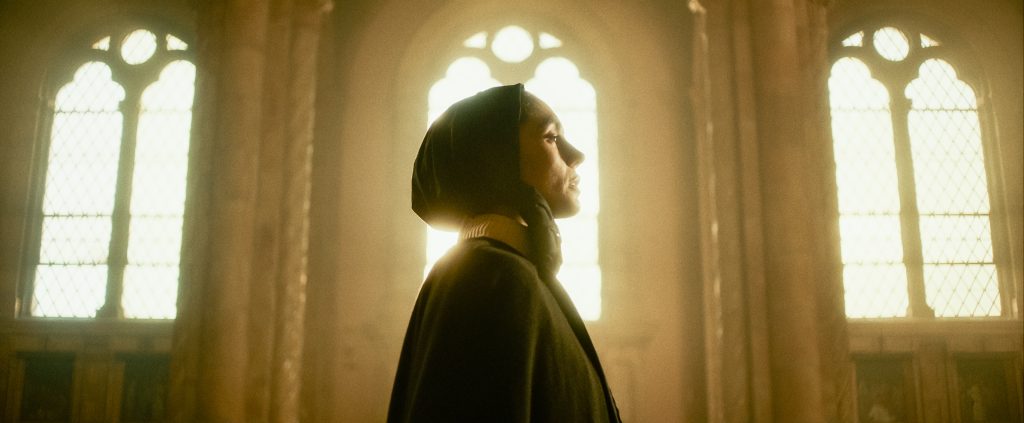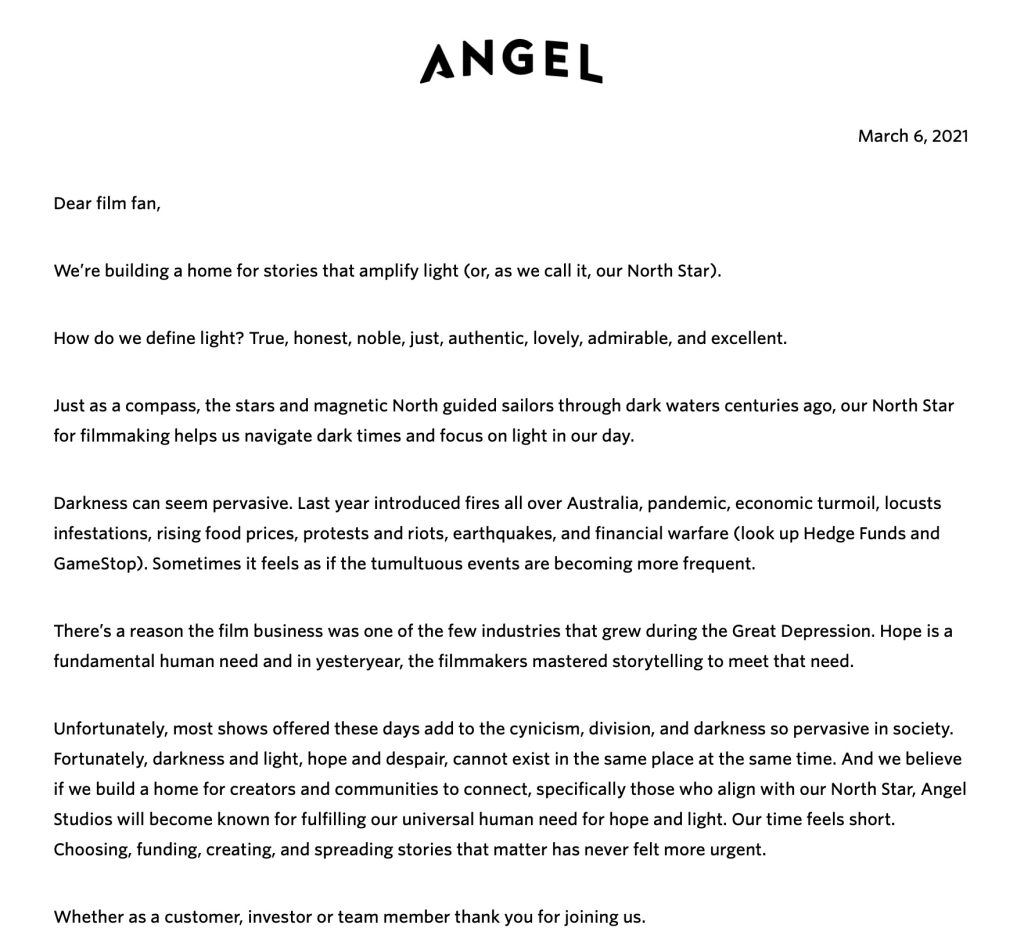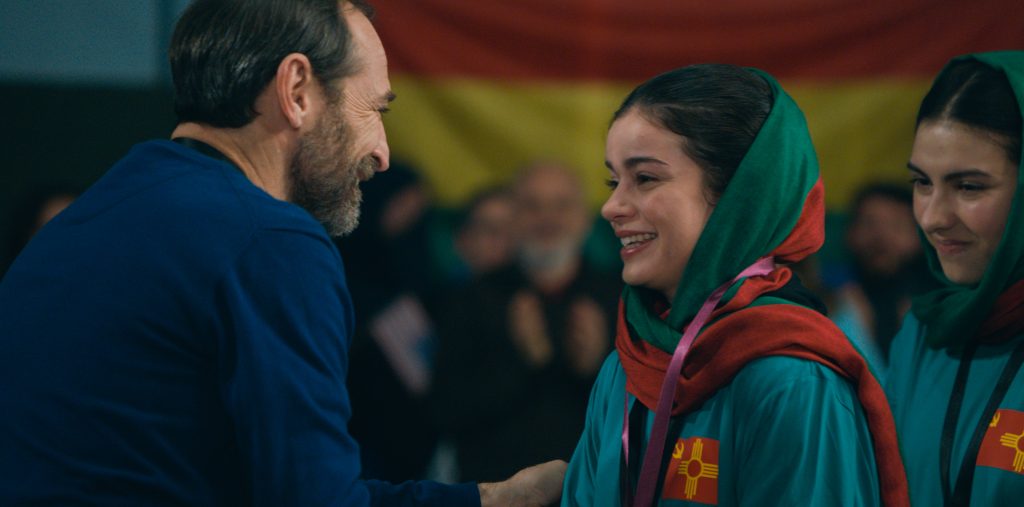The moral basis for Angel Studios is more complicated than people realize.

BY: Ethan Inman
“Christians are very accepting and naive,” Terry Lindvall, the C.S. Lewis Endowed Chair in Communication and Christian Thought at Virginia Wesleyan University tells me. “Many of them are basically ignorant of their own doctrine, of their tradition.”
According to Lindvall and many others, the rapid rise of the film company Angel Studios is at least somewhat related to a kind of Christian ignorance.
Lindvall isn’t saying that Angel Studios is intentionally up to anything nefarious or misleading. Their films are telling stories that aim to amplify positive messaging.
What he is simply pointing out is a deeper religious and moral tension at work that many supporters and detractors of Angel Studios don’t even realize is in play. That tension is important to explore, especially for people who support the studio and influence the studio’s decisions related to acquiring content.
The value proposition that many people believe that Angel Studios is making turns out to be quite different from the ideals the company commits to in reality.
Essentially, Angel Studios is not actually a Christian film company.
This is not a hot take. They, in fact, don’t even claim to be one.
In a page about their company values on their official website entitled “Why Angel Studios? What is our North Star?” the company states “We’re building a home for stories that amplify light (or as we call it, our North Star).”

The page goes on to describe, in generality, the company’s mission to amplify light and “truth” and combat darkness. But never once is Christianity mentioned.
Obviously, this will come as a surprise to many. Across the board, the content that Angel Studios has distributed has been overwhelmingly connected to the Christian faith, leading many people to assume that the company has some sort of basis in Christianity.
But that basis is nowhere to be found, at least not officially.
When Angel Studios was founded in 2014, it was under the name VidAngel. Then, the company’s main business model was to take popular secular films with explicit content and censor/remove the adult content so that the films would be accessible to a wider audience.
This was all started by family members Neal Harmon, Daniel Harmon, Jeffrey Harmon and Jordan Harmon, alongside Benton Crane. They all identify as members of the Church of Jesus Christ of Latter Day Saints.




Latter Day Saints, historically known as the “Mormon” Church, view themselves as Christians according to their official website. But because of the church’s doctrine, which considers the Book of Mormon to be scripture inspired by God in addition to The Bible, many faith experts consider them to be another religion entirely.
“There are differences of what traditional Christians – Orthodox Christians, Catholics and Protestants – believe and what Latter Day Saints believe,” Lindvall said.
Regardless of whether that distinction has validity or not, Angel Studios doesn’t claim to be a Latter Day Saint company either, so that can’t be considered an official factor in the values of the company. None of Angel Studios’ films have explored doctrine unique to the Latter Day Saints; the protagonist that the film “Sound of Freedom” (2023) was based on is a Latter Day Saint, but the film doesn’t delve into beliefs specific to the Book of Mormon or additional Latter Day Saint theology.
Beyond official claims on the company website, Angel Studios lacks religious unity on a staffing level as well.
David Fischer, who serves as the Director of Business Affairs and Acquisitions for Angel Studios, identifies as a Catholic. He mentioned that there are members of the company who don’t even identify as religious at all, though he asserted they are all united around a common mission of promoting positivity and “light”.
“When I experienced that ‘North Star’ at the company, and I saw it lived out in a certain way where everyone that I was engaged with, whether they were religious or not, it wasn’t kind of based on religion per se, it was based on these sentiments of nobility and excellence,” Fischer said.
So beyond the company’s lack of explicit religious claims in its official branding, religious unity is not represented in its hiring pool.
The studio has touched on Christian themes in most of its content, including its theatrical releases so far.
But not all of them – “Rule Breakers” (2025) features Muslim main characters and most reviews claim the film steers clear of Christian advocacy entirely.

In addition, the films that have tangential religious themes don’t even claim to be faith-associated on the surface – many of the official trailers do not mention Christian themes.
Trailers are important to the marketing of any film, but they actually seem to be especially key to the success of Angel Studios.
“The trailers are really attractive, they look good in marketing,” said Zachary Sheldon, a Lecturer in the Department of Film and Digital Media at Baylor University. “Ultimately, that’s the point is to get you to see the movie, it sort of doesn’t matter how good the movie is.”
They are able to attain such impressive trailers because of their production value, which has consistently impressed critics across the board.
“These are very professional productions,” said William Bibbiani, a professional film critic who writes for The Wrap and other major publications.
Official synopses do not mention Christian themes either. The film “The Shift” (2023), for example, is clearly a reimagining of the story of the Biblical Book of Job upon viewing. But the official synopsis for the film on the Angel Studios website reads, “Kevin Garner (Kristoffer Polaha) travels across worlds and dimensions to reunite with Molly (Elizabeth Tabish), the love of his life. A mysterious adversary known as The Benefactor (Neal McDonough) upends Kevin’s world as he tries to escape an alternate dystopian reality.”
There is nothing to indicate that this film isn’t a secular science fiction film, and it’s entirely plausible that a typical fan of sci-fi or multiversal films may not be aware of Angel Studios’ reputation and see the film unaware of the religious content they are going to experience.
So, other than the small sample size of Angel Studios content in recent years, the company’s reputation as a Christian one has very little basis, and the studio itself doesn’t even claim to have a strictly Christian mission.
The evidence shows that instead of having a religious basis, it is vaguely conservative and provides surface-level affirmation of then culture of American Christianity.
“The emphasis is on creating a shared moral and political culture, which is where the Mormon and Christian worlds overlap,” Sheldon said.
This may not be the most thrilling fact for Christian fans who support the company to see deeply and specifically Bible-inspired content.
But it might be positive news for a more general audience, as it makes the films more accessible for people who don’t identify as Christians to both work on and consume.
“If they can still allow a variety of people to come in and make their films and distribute them, I think that’s always a good thing. I like to see people who haven’t had an opportunity make films,” Lindvall said.

Ultimately, though the messaging of Angel Studios is certainly targeted to conservative people groups, that does make the films more wide reaching and accessible for people who may disagree on theology but agree on morality.
Because of all of this, Angel Studios could face a lot of criticism from many different groups. There are traditional Christians and Latter Day Saints both who want to see their films delve into more theological themes. There are film fans who are critical of the quality of the films and clamor for more nuance.
And on the other hand, there are plenty of fans who are big fans of the films and are perfectly fine with, or unaware of, the complications that occur below the surface.
But whether an individual is a fan that wants to see the current ways reinforced or a critic who wants to see things change, the financial aspect of the Angel Studios model could fuel their vision for the future of the company.
Angel Studios has a unique relationship with their fans through the Angel Guild, which is a subscription-based crowdfunding model. Each member of the Angel Guild, whether they have a basic plan or premium plan, gets to vote on what films get made by the studio, which plays a critical role in what eventually does or doesn’t hit theaters.

Sheldon pointed out that no matter who may be working at the company or what kind of content those filmmakers may want to see, the Angel Guild model allows film fans to have a significant amount of power.
“You become intensely beholden to your stakeholders in terms of the messaging you can convey,” Sheldon said.
This is something that even the studio itself boasts about.
“I love that Angel Studios starts with the audience,” Fischer said. “There’s no team of us, no matter how high we are at the company, that sits around a table and greenlights a film. It always starts with the audience saying this is a film we want to see.”
So what is the basis for the specific kind of light that Angel Studios amplifies?
As it turns out, it’s the fans. Whatever the fans consider to be “light”, and whether they believe Angel Studios is the right company to amplify that light, will likely shape the messaging that Angel Studios amplifies in the future. Or whether they make anything at all.
So people, especially those who identify as Christians, want to see changes in the types of films that are made at Angel Studios, they have access to the kind of power to make at least a small change.
They just need to stay informed about the companies they support, convicted about what they actually believe, and thoughtful about how those two things align.